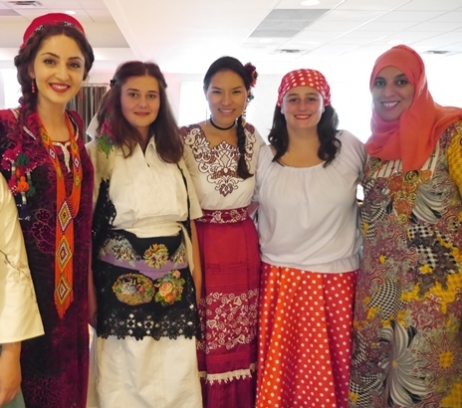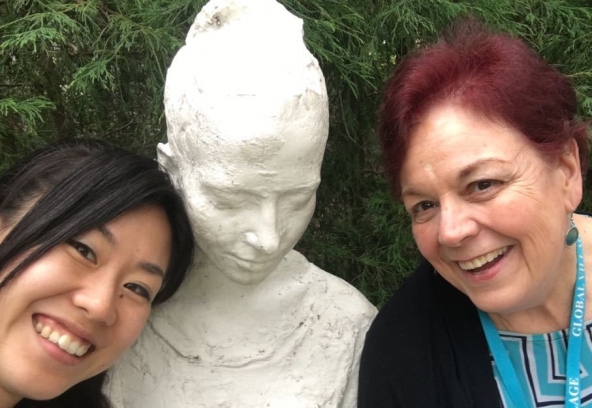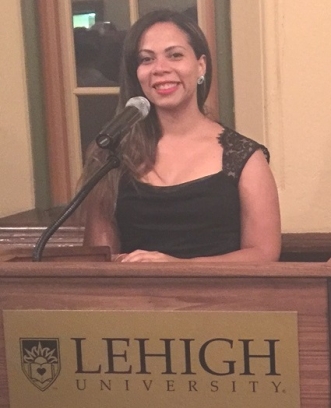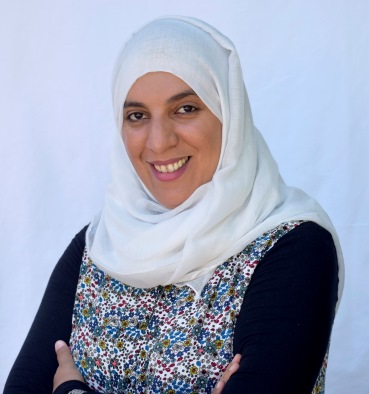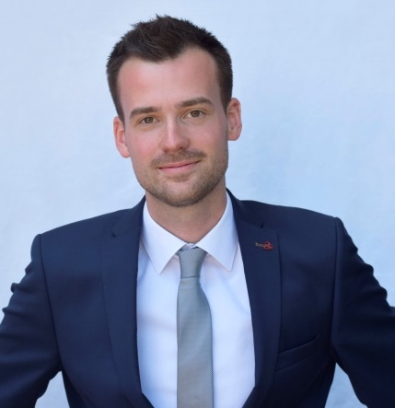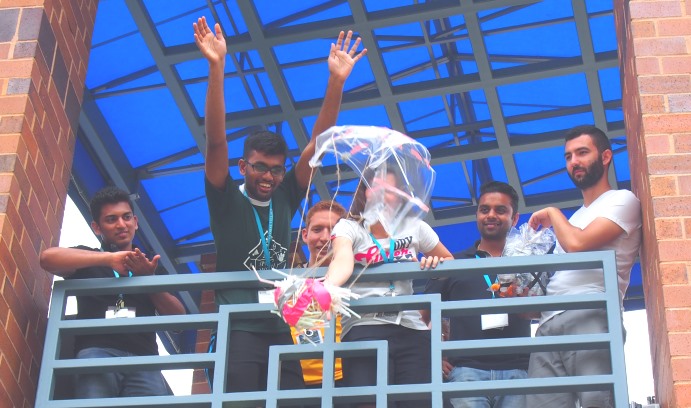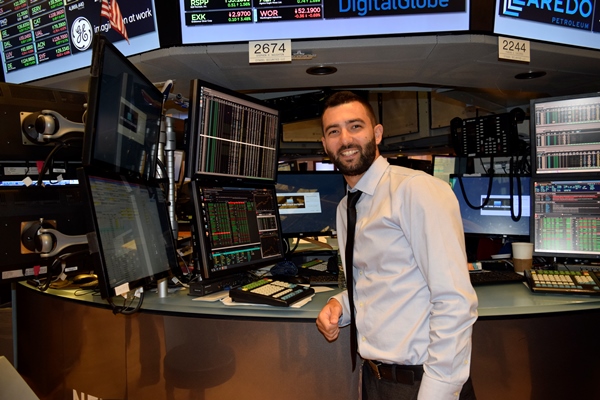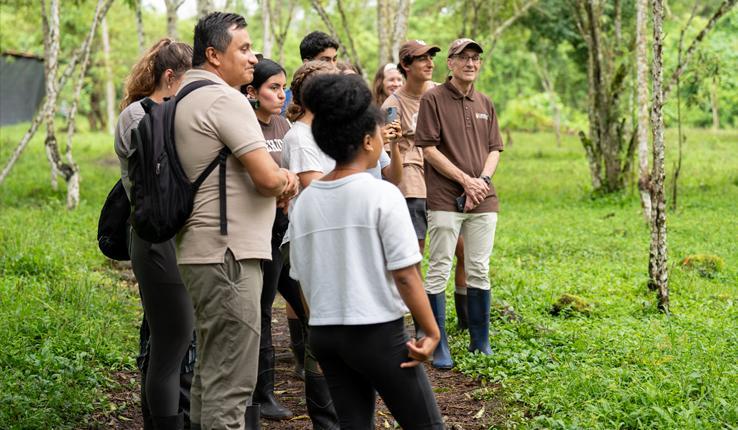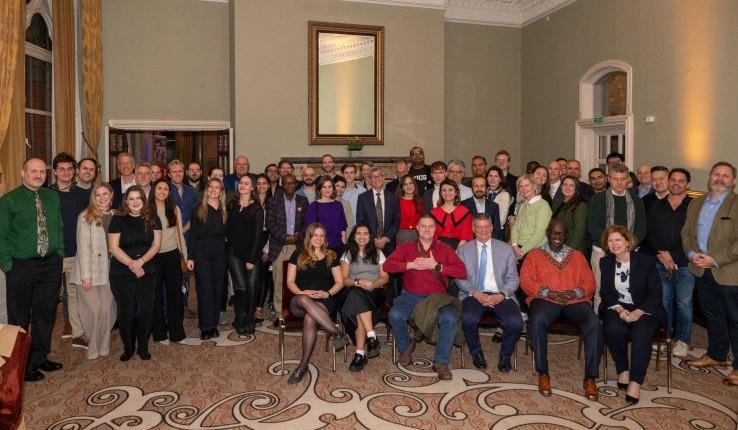Another Encore for Global Village
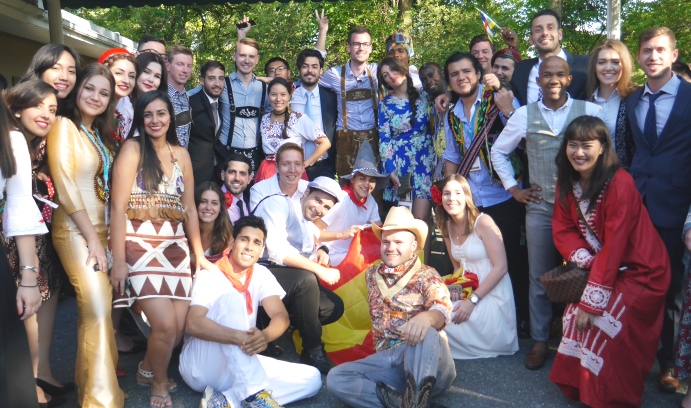
At the Opening Gala for Global Village 2017, many of the participants dressed in their national attire. One hundred young people from 53 different countries attended this year’s Village.
The Iacocca Institute’s Global Village for Future Leaders of Business and Industry marked its 21st anniversary this summer when 100 young adults from 53 countries converged on campus.
Hailing from Europe and Africa, South and North America, the Middle East and Asia, the Villagers spent five weeks honing leadership, business and entrepreneurship skills and completing team projects for companies. Global Village 2017 also included a contingent of 25 young professionals from 16 African nations who came to Lehigh through the Mandela Washington Fellowship for Young African Leaders.
Global Village was established in 1997 by the Iacocca Institute, now part of Lehigh’s office of international affairs. More than 2,100 people from 139 countries have completed the program. This year’s Global Villagers ranged in age from 18 to 36 and included business owners and social entrepreneurs; lawyers, teachers, IT managers and other professionals; and undergraduate and graduate students.
The Villagers’ cross-cultural experience, says Kira Mendez, director of the Iacocca Institute, begins as soon as they move into the Upper Centennial residence halls. There they live with roommates from different countries and cultures. They also buy their food and cook meals together in the dormitory’s kitchen.
“The hallmark of Global Village,” says Mendez, who helped design and establish the program in the mid-1990s, “is that Villagers practice diversity on every dimension you can think of. A key part of this is living together and cooking and eating together. This requires Villagers to get to know each other as people first, not as a homogeneous cohort.”
The GV curriculum, which is directed by Trisha Alexy, allows Villagers to choose from a variety of options. Each Villager is required to give a presentation on their home country and on the advantages of investing and doing business there. Villagers may also choose to give a workshop on a topic of their choice. “Hot topic sessions” are also held; these can be initiated by Villagers or by GV staff.
“These sessions can become very intense,” says Mendez. “One year, an Israeli and a Palestinian from Gaza teamed up to talk about the tensions in their region. Every year, we have Villagers from countries that are in active conflict, and this year was no exception. We don’t shy away from it—they find their own way.”
Corporate executives, Lehigh faculty and staff, and GV alumni visit the Village to lead workshops and hold informal discussions. The GV staff organizes site visits to local companies such as Orasure, Olympus and Martin Guitar, as well as trips to New York and Washington, D.C. Community service is also stressed. This year’s Villagers spent six hours with children with special needs at the Miracle League of the Lehigh Valley in Schnecksville.
Each Villager is assigned a guide, usually an alumnus from a previous Global Village. Guides (there were eight this year) live in the residence halls and help the Villagers determine what they can contribute to the program and how to reach the goals they set for themselves.
With help from a few external mentors, the guides also help lead project teams, each of which includes half a dozen Villagers from as many countries. Each team consults with a company on a specific challenge or opportunity. This year’s clients included a global chemical firm promoting a new bioremediation process, an ecologically minded fashion company looking for manufacturers and designers, and a nonprofit trying to improve public schools in a South American country.
“These consulting projects are a very valuable way for people to learn to collaborate across cultures,” says Mendez. “The teams are very diverse in terms of age, background and country. Everyone is expected to contribute and work together.
“The result is that mentorship occurs from multiple dimensions. The Villagers are mentored by the guides, by the external mentors and executive visitors, by the Global Village staff and by the clients they work for.
“The Villagers also mentor each other. For example, you might have a 32-year-old entrepreneur and an 18-year-old university student on the same project team. The 32-year-old can mentor the 18-year-old while also learning to see through the eyes of a younger person.”
Global Village also allows time for culture nights, music and dancing, and other diversions.
The ties formed by Global Villagers have proved durable, says Mendez.
“We have a network of alumni who are really very connected to each other. They feel a bond even if they live in distant countries.”
Last summer, Mendez traveled to London with Lehigh President John Simon and Cheryl Matherly, vice president of international affairs, for an Our Lehigh event with Lehigh alumni.
“Before we went, we put the word out to GV alumni in London. About 25 former Villagers from all over Europe and even from Israel came to London to meet with us. They had attended Global Village in different years, from 1998 to 2015, but within minutes, we got connected and felt like family.
“This happens wherever we go.”
By their own telling, this year’s Villagers forged a similar sense of community. The following accounts offer a glimpse into the experiences of four new Global Village alumni.
Fair trade in Bangladesh and Nepal
Global Village 2017 came at an opportune time for Ayako Inose.
Inose, who lives in Tokyo, works for the Fair Trade Section of Shapla Neer, a Japanese nongovernmental organization (NGO) that seeks to improve living conditions for people in Bangladesh and Nepal. Inose began volunteering for Shapla Neer 10 years ago. For one year following the 2011 earthquake and tsunami that devastated the nuclear power plant in Fukushima, Japan, Inose led Shapla Neer’s efforts to provide services and support to victims of the disaster.
In October, she will move to Bangladesh for one year to oversee Shapla Neer’s main office in the capital city of Dhaka.
Global Village helped her gain confidence speaking English, said Inose, and to become more adept at describing the principles and the benefits of fair trade to people in Japan. It also allowed her to give a presentation describing the history of Shapla Neer and its devotion to people living in rural areas of Bangladesh.
In Bengali, the national language of Bangladesh, said Inose, Shapla Neer means “house of the water lilies.” The NGO was formed in 1972, in the aftermath of a civil war in which Bangladesh gained its independence from West Pakistan but was left devastated.
“At that time,” said Inose, “Bangladesh was very, very poor, there was a lot of corruption and it was difficult to find jobs in rural areas. There was much support for Bangladesh from around the world, but most of it focused on the central government and the cities. The people in rural areas could not get access to services.”
Poverty and lack of employment in rural areas continue to be problems, said Inose, and they have caused thousands of Bangladeshi families to move to the cities to seek work. Many of these families have broken up, leaving a large population of street children and child laborers.
“These kids have no time to be children,” said Inose. “Sometimes they work from early in the morning to midnight. There’s no learning, no playing. We want them to have time to be children and to get an education.”
Shapla Neer seeks to improve the lives of children, the elderly and disabled by helping individuals set up home businesses and make products such as handbags, wallets, earrings and soap. The NGO helps people market their products, said Inose, while adhering to the principles set out by the World Fair Trade Organization.
“Fair trade means there should be an equal relationship between producers and consumers, between people in Bangladesh and people in Japan,” she said. “It means that the producers in Bangladesh get a fair wage for their product and can live in their home communities with their families.”
The five weeks she spent at Global Village, said Inose, represent the longest period of time she has spent outside Japan. The experience has motivated her to redouble her efforts to improve her English
proficiency.
“This was an amazing opportunity for me,” she said. “The members of my group were very helpful and kind, and they always tried to help me when I had difficulty understanding something.”
Common human experiences
Kelly Jaimes, a lawyer who teaches international public law at the Peruvian University of Applied Sciences in Lima, Peru, had traveled and studied in several European countries before this summer. What distinguished Global Village, she said, was the focus on teamwork and real-world projects. Living in a dormitory also helped break down barriers.
“I got sick one week and had to go to the emergency room for six hours,” she said. “Then I had to rest for two days in the dorm. The other Villagers helped me like a brother or sister. One person cooked my dinner, someone else cooked my breakfast and someone else stayed with me at the hospital.
“It’s not just a group of friends I’ve made here but a new family.”
Jaimes worked with people from Spain, Italy, Kosovo and India on a team project for a marketing research company focused on Latino consumers in the United States and on Latin America.
“Our client wanted to learn more about the behavior of the Latino community in the United States,” she said. “We did in-depth interviews with opinion leaders and we studied government databases. I think our team members who aren’t Latino learned a little bit of our customs, behavior and language.
“Working with a group like this gives you another view of things. Not all the team members have the same knowledge or experience, but everyone makes an important contribution.”
Jaimes also led the other Villagers in a workshop on human mobility and immigration. Peru, she said, is a nation of immigrants like the United States. It has recently received an influx of refugees from neighboring Venezuela, which is beset with severe economic and political problems.
“Global Village allowed us to exchange opinions,” she said. “The Africans talked about their refugee experiences and the Europeans discussed theirs. They’re similar but different. Maybe we can find a common response.”
Global Village taught her several valuable lessons, Jaimes said.
“I learned a lot about other cultures from the country presentations,” she said. “I learned how to do business in other countries—what is ‘correct’ in one country might not be ‘correct’ in another. I learned other ways to make presentations, I learned to work better under pressure and I learned that you have to have confidence in your team; you have to delegate, you can’t always take on every task yourself.
“Global Village was an amazing experience. It’s changing my way of thinking.”
The Omani perspective
Fatma Al Maamari seldom misses an opportunity to tout the success and good fortune of her home country of Oman. Bordered by Yemen, Saudi Arabia, the United Arab Emirates, Qatar and Iran, Oman, which is about the size of New Mexico, is one of the most stable and prosperous nations in the Middle East.
“We are a very peaceful country,” said Al Maamari. “We’ve had the same president since 1970, Sultan Qaboos bin Said al Said. He’s raised our lifestyle, and he’s given women equality, empowering us to get an education and to work. He’s very much aware of the need for environmental protection, and he’s the first president of a Gulf nation to do sustainable development.”
In Oman, Al Maamari is an instructor at the Sultan Qaboos College for Teaching Arabic to Non-Native Speakers in the city of Manah. She teaches international students from around the world as well as members of the diplomatic corps in Oman.
At Global Village, Al Maamari taught sessions on Arabic language and Omani culture to her colleagues.
“Global Village was an unforgettable experience,” she said. “It inspired me and gave me the power to do my best and be the best. I hope to return to participate in the future as a volunteer.”
In her team project, Al Maamari worked with Villagers from Spain, China, Uzbekistan, Azerbaijan, India and Peru on the 2017 Global Village yearbook.
“We were seven minds from seven countries trying to tell the story of Global Village 2017,” she said. “The project improved my listening and creative thinking skills, my team-building skills and my cultural intelligence.”
One of the most memorable experiences at Global Village 2017, said Al Maamari, was volunteer day, when the Villagers spent six hours with children with special needs at the Miracle League of the Lehigh Valley in Schnecksville.
“We played a baseball game with the kids,” said Al Maamari. “There were four teams—brown, blue, black and red. Although they are disabled, they keep going, they have hope. They inspired me to be more patient and to see life from a different point of view.”
Just over a decade ago, Al Maamari spent one year in the state of Georgia teaching Arabic as a Fulbright Scholar. She returned to the United States for one month in 2012 to take part in an exchange program.
“Global Village has opened doors for me,” she said. “It’s given me the opportunity to meet the whole world at one time. From the first day I arrived here, I feel like I’m with my family. I’m hoping now to study for an M.B.A. and perhaps start a new job in business.”
The view from Leer, Germany
Sönke Bojunga is information technology manager at a bank in Leer in northern Germany. Global Village 2017 gave him the opportunity to visit the United States for the first time.
“After I completed my bachelor’s degree in computer science and economics, I worked for my bank for two years,” he said. “Like a lot of other young people, I felt I had to do something more, so I went for my M.B.A. at the Hochschule der Sparkassen-LeerWittmund in the University of Applied Sciences in Bonn.
“One of the requirements of the program is to do a summer or semester term abroad. It’s been my dream to go to the United States.”
Bojunga checked out programs similar to Global Village at Harvard, Boston University and other American schools. Then he attended a presentation about Global Village that was given at the Mercator School at the University of Duisburg-Essen, which has ties to both Lehigh and the Sparkasse Hochschule.
“I got a feeling in my stomach that Global Village was the best fit for me,” he said. “It’s amazing that people from 50 different countries come together to live, learn, cook and eat together.”
Years of watching English-language TV programs and Ted talks, with and then without subtitles, helped Bojunga acquire a measure of fluency in English, but he said it took him time to hit his stride at Global Village.
“I was scared to speak English the first week and a half until I realized that everyone else was speaking English and making mistakes. It really is like a family here. I talked to everyone here. I found out that inside we all have the same problems, the same fears.”
For his team project, Bojunga and Villagers from Hong Kong, Israel, China, Spain and Tajikistan were matched with a company that has developed a platform to help people find private tutors and music instructors. The team’s assignment was to draw up a strategy and a media plan for the company to gain entry into the Japanese and Chinese markets.
“We had to learn about the typical business and consumer behaviors in China and Japan,” said Bojunga. “We found that the [online] payment system in China is different from Europe and the U.S. Also, the Chinese government puts restrictions on social networks and blocks some websites. So we narrowed our project down to Japan.”
Bojunga said he was impressed that so many instructors urged the Villagers to pursue their passions.
“One thing that I took away from Global Village was that you have to follow your dream because you can only be truly satisfied in life if you love what you do. Our instructors were always saying to us, ‘You can do it.’
“The executives who came to our classes told us their stories, about their failures and mistakes, and how they tried again and again until they succeeded. They said you have to believe in yourself, stay with your passions, learn from your mistakes, and surround yourself with people who believe in you.
“Global Village supports you in your dreams.”
Story by Kurt Pfitzer
Photos courtesy of Global Village
Posted on:


